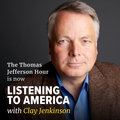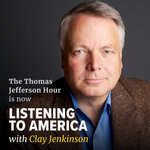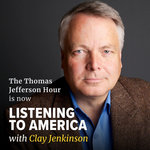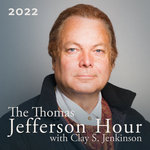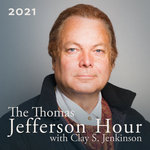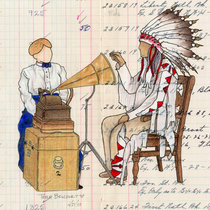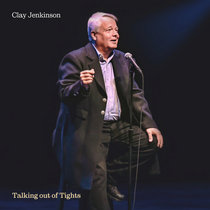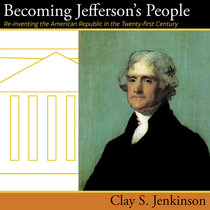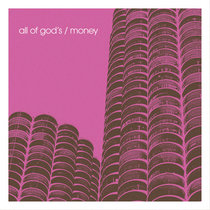
Enemy of the People
from What Would Thomas Jefferson Do? (2018) by Listening to America with Clay Jenkinson
1776 Club exclusive
-
1776 Club
Join now to receive all the new shows Listening to America with Clay Jenkinson creates, including 19 back-catalog releases, delivered instantly to you via the Bandcamp app for iOS and Android. You’ll also get access to supporter-only exclusives like this track. Learn more.Join Now $5 USD/month or more
about
DS: 00:00 Good day, citizens, and welcome to What Would Jefferson Do?, our weekly opportunity to discuss current American events with President Thomas Jefferson, who is seated across from me now. Good day to you, Mr Jefferson.
CSJ as TJ: 00:15 Good day to you, my dear citizen.
DS: 00:17 Mr Jefferson, I wanted to talk to you about political rhetoric. I think every politician uses rhetorical arguments. Maybe speaks above what he actually believes to make points, but at what point does it become too much, even dangerous?
CSJ as TJ: 00:35 I differentiate between my time as president, between 1801 and 1809, when I attempted to be as mild as possible and always to play down any volatility, and then my time out of power when I spoke private letters in a much more dramatic and sometimes, I suppose you'd say, extreme fashion, so as a public figure I felt that it was my duty always to smooth the waters and to be more harmonious perhaps than I even felt. Several of my annual messages to Congress were seen by my political adversaries as what they called milk sops or things of milk and water because I was so mild about things that they knew were quite serious national and international affairs. But in private when I was writing a letter to Mr Madison or Francis Hopkinson, or to John Adams, or to Elbridge Gary, I tended to speak a little bit more forcefully. And in fact, my dearest friend, James Madison, after my death said, you have to understand in Jefferson and other men of great genius that there are sometimes as a tendency to overstate the case. And I think that certainly could be said of some of my private pronouncements.
DS: 01:52 Well far be it from me, Mr Jefferson, to be critical of you. But I can say that in my time it alarms me, some of the rhetoric that I hear coming out of, both elected politicians, the press, commentators, really lost a great deal of civility, you know, I understand people wanting to further their arguments and convince an audience, but I just don't understand how it's gone so far in my time.
CSJ as TJ: 02:23 Well, there's an old stoic view of the world that comes from ancient Rome, and to a certain degree, ancient Greece and it goes something like this. "This too will pass." That whatever it is, whether it's a moment of great national ecstasy and sense of triumph or on the other hand, some period of great volatility and social tension, that this will pass, and things that seem extraordinarily important, even crucial at the moment will turn out in retrospect to have been relatively minor matters. And so the great momentum of the middle — of consensus, of common patriotism, of common identity as citizens of the American republic. These are the eternal truths of American life and it is always possible in the heat of the moment to overreact and to consider this to be the crisis moment. I was susceptible of this in my private correspondence. I would say sometimes, 'This is the greatest crisis in the history of the country since the Stamp Act,' or, 'Nothing since the revolution has created more tension than this.' Well, if you say that five or six times in the course of your life, that proves that that can't be true, that you always want to make the moment more dramatic than it in fact is and it's in our interest to contextualize and to realize as the stoics always said, sic transit. This too must pass.
DS: 03:50 Thank you Mr Jefferson, and I feel better with your reassurances. However, I do worry about some segments of the population. The press. I know you were not always friendly with the press. There are those today in my time have taken to using the phrase enemy of the state, which is, I think, a phrase that goes back to before your time, and it frightens me to have the press referred to as an enemy of the state.
CSJ as TJ: 04:19 Well, it isn't. Of course, I was frustrated by the press and I actually once said that every newspaper should be divided into four sections: truth, probabilities, possibilities, and bald lies — and I daresay every president, John Adams, George Washington, James Madison, James Monroe, John, John Quincy Adams, and Andrew Jackson — the presidents of my time complained bitterly about the unfairness of the press, but in my second inaugural address, I focus on this and say, the alternative is tyranny. So whatever's wrong with the press, we must defend it, because the alternative is tyranny.
DS: 04:53 Thank you very much, Mr Jefferson.
CSJ as TJ: 04:55 You are most welcome, sir.
CSJ as TJ: 00:15 Good day to you, my dear citizen.
DS: 00:17 Mr Jefferson, I wanted to talk to you about political rhetoric. I think every politician uses rhetorical arguments. Maybe speaks above what he actually believes to make points, but at what point does it become too much, even dangerous?
CSJ as TJ: 00:35 I differentiate between my time as president, between 1801 and 1809, when I attempted to be as mild as possible and always to play down any volatility, and then my time out of power when I spoke private letters in a much more dramatic and sometimes, I suppose you'd say, extreme fashion, so as a public figure I felt that it was my duty always to smooth the waters and to be more harmonious perhaps than I even felt. Several of my annual messages to Congress were seen by my political adversaries as what they called milk sops or things of milk and water because I was so mild about things that they knew were quite serious national and international affairs. But in private when I was writing a letter to Mr Madison or Francis Hopkinson, or to John Adams, or to Elbridge Gary, I tended to speak a little bit more forcefully. And in fact, my dearest friend, James Madison, after my death said, you have to understand in Jefferson and other men of great genius that there are sometimes as a tendency to overstate the case. And I think that certainly could be said of some of my private pronouncements.
DS: 01:52 Well far be it from me, Mr Jefferson, to be critical of you. But I can say that in my time it alarms me, some of the rhetoric that I hear coming out of, both elected politicians, the press, commentators, really lost a great deal of civility, you know, I understand people wanting to further their arguments and convince an audience, but I just don't understand how it's gone so far in my time.
CSJ as TJ: 02:23 Well, there's an old stoic view of the world that comes from ancient Rome, and to a certain degree, ancient Greece and it goes something like this. "This too will pass." That whatever it is, whether it's a moment of great national ecstasy and sense of triumph or on the other hand, some period of great volatility and social tension, that this will pass, and things that seem extraordinarily important, even crucial at the moment will turn out in retrospect to have been relatively minor matters. And so the great momentum of the middle — of consensus, of common patriotism, of common identity as citizens of the American republic. These are the eternal truths of American life and it is always possible in the heat of the moment to overreact and to consider this to be the crisis moment. I was susceptible of this in my private correspondence. I would say sometimes, 'This is the greatest crisis in the history of the country since the Stamp Act,' or, 'Nothing since the revolution has created more tension than this.' Well, if you say that five or six times in the course of your life, that proves that that can't be true, that you always want to make the moment more dramatic than it in fact is and it's in our interest to contextualize and to realize as the stoics always said, sic transit. This too must pass.
DS: 03:50 Thank you Mr Jefferson, and I feel better with your reassurances. However, I do worry about some segments of the population. The press. I know you were not always friendly with the press. There are those today in my time have taken to using the phrase enemy of the state, which is, I think, a phrase that goes back to before your time, and it frightens me to have the press referred to as an enemy of the state.
CSJ as TJ: 04:19 Well, it isn't. Of course, I was frustrated by the press and I actually once said that every newspaper should be divided into four sections: truth, probabilities, possibilities, and bald lies — and I daresay every president, John Adams, George Washington, James Madison, James Monroe, John, John Quincy Adams, and Andrew Jackson — the presidents of my time complained bitterly about the unfairness of the press, but in my second inaugural address, I focus on this and say, the alternative is tyranny. So whatever's wrong with the press, we must defend it, because the alternative is tyranny.
DS: 04:53 Thank you very much, Mr Jefferson.
CSJ as TJ: 04:55 You are most welcome, sir.
lyrics
"Whatever's wrong with the press, we must defend it, because the alternative is tyranny."
— Clay S. Jenkinson portraying Thomas Jefferson
— Clay S. Jenkinson portraying Thomas Jefferson
credits
from What Would Thomas Jefferson Do? (2018),
track released August 14, 2018
jeffersonhour.com/blog/1299wwtjd
jeffersonhour.com/blog/1299wwtjd
license
all rights reserved
tags
about
Listening to America with Clay Jenkinson
The Thomas Jefferson Hour is a weekly radio program dedicated to the search for truth in the tradition of Thomas
Jefferson.
Nationally acclaimed humanities scholar and award-winning first-person interpreter of Thomas Jefferson, Clay S. Jenkinson, portrays Jefferson on the program, and he answers listener questions while in the persona of our third president.
... more
contact / help
Listening to America with Clay Jenkinson recommends:
If you like Listening to America with Clay Jenkinson, you may also like:

